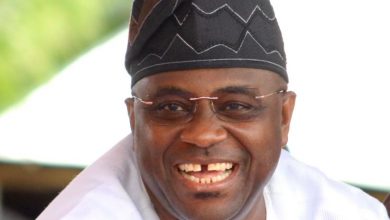Women and Power: How Ready Are They?
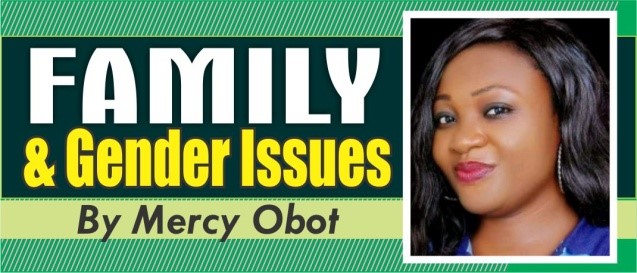
The rise of equality by the women to occupy more seats in the political empire has been on an increase. The birth of 21st century has awoken the desire of women to be in the corridors of power so that they can be heard and seen beyond the female stereotype.
Interestingly, their burning zealot dream is gradually coming to the gleam of reality and few have been opportune to contribute their quota to national development. Although the pace of the new development may be on a slow lane, it is pertinent to note that for women to gain more grounds to be entrusted with leading roles in political affairs, they have to work together to prove they are extremely credible to compete with their male counterparts.
Power has been a male construct and for thousands of years, women are often seen as object of sex whose calling is marriage alone and their virtue is meekness. When such perception is contradicted and all of a sudden, women are seen wielding for power, men have a hard time adapting to such form of action because it makes them to be so uncomfortable.
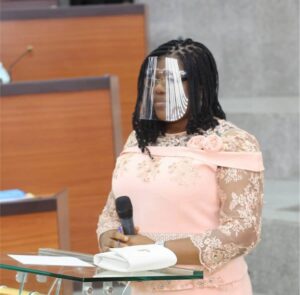
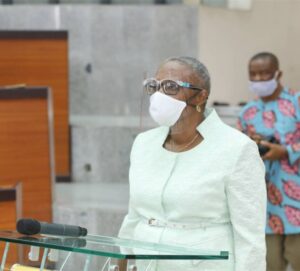
Since the return of democracy in 1999, the Senate has been dominated by males. In 1999, there were only three women out of the 109 members, representing 2.8 per cent of the members of the Senate. In 2007 the number increased to eight (7.3 per cent). However, there was a decrease from eight women members in 2007 to seven in 2011, which is 6.4 per cent and eight (7.3 per cent) in 2015.
Members of House of Representatives – In 1999, the number of women in the House of Representatives was 12 out of 360 members, which was about 3.3 per cent but increased to 21 (5.8 per cent) in 2003. It was 26 (7.2 per cent) in 2011, in 2015 the number of women in the House of Representatives decreased to 19 (5.3 per cent) out of 360 members.
In Akwa Ibom State House of Assembly, the Affirmative Action of the 35 per cent of women seems to take a back seat as two women out of 26 lawmakers make up the legislature of the state. In the local government, there is only one female council boss out of 31 chairmen.
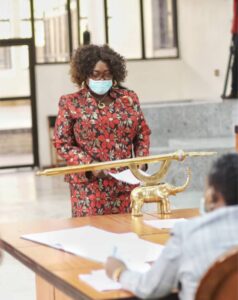
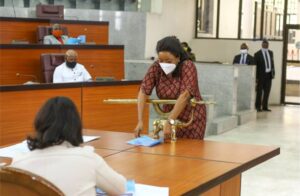
This low numbers of female representation in political empire shows that the Nigerian government has been reluctant to implement laws to improve gender equality in politics according to the National Gender Policy (2006) which recommended a benchmark of 35 per cent of seats in parliament to be filled by women.
There was also a campaign advocating that 35 per cent of Nigeria’s women be given political appointment to align with what was agreed upon at the Beijing Women’s Conference of 1985, China.
For the number of women to be on the rise in parliaments and cabinets, judiciary and police forces, formal employment and education, there is a high demand for a collaboration of women to unite and have one voice to have victory in being heard or taken serious.
It is quite unfortunate that those women who have political aspirations don’t receive full support from their fellow women. Although many women line up to exercise their franchise during elections, it is sad to note that they vote for the male candidates rather than the females because of being bribed with finances.
A perfect example is Mrs Sarah Jubril who lost the 2011 presidential election primary to Dr Goodluck Jonathan, notably getting only a single vote. No woman cast vote for her, and the single vote came because she voted herself.
Apart from women’s uniting, there are other ways women can show that they are ready to rise above stereotypes to have more seats in the male dominating atmosphere.
According to the United Nations, women perform 2/3 of the world’s work but earn only 10 per cent of the world’s income. Women living in poverty carry the overwhelming burden of domestic responsibilities; they tend to have multiple roles as wives, mothers, daughters, community caregivers and income-generators.
In her paper presentation on Monitoring Participation of Women in Politics in Nigeria, Mrs. Oloyede Oluyemi recommended that there is need for “establishment of legal funds to assist women politicians to challenge electoral malpractices of any form at all levels of political processes.”
It is not out of place for women to campaign against increase of heavy incidental expenses that are peculiar to the Nigerian type of democracy so that more female candidates can contest in elections.
Female gender is however given a boulevard of opportunity to participate in public decision-making if they are found competent. Emily Oghale asserted to this when she said women with credible track records in their various fields of endeavour are automatically granted with the power to seat among kings; giving instances in the case of Justice Aloma Mukhtar in 2012, who was appointed the Nigeria’s first female chief justice of the federation by President Goodluck Ebele Jonathan’s administration because of her incredible achievements in the judiciary.
This can also be seen in the recent appointments of the eight nominees appointed by the Akwa Ibom Government for the positions of commissioners and special advisers into the State Executive Council, whereby two women made the list due to their wealth of experiences in their different fields.
Networking is another important quality women have to develop to get to the top. According to Mrs Oloyede Oluyemi, “Political parties should create a support network for prospective aspirants by pairing them with established women politicians who will be playing key role as mentors and provide capacity building for young or aspiring female politicians so as to enhance and develop them ahead of subsequent elections.”
Over the years, men have built a healthy networking system in business and politics, and it is of essence for women to have the ability to build a strong networking system that will produce more female representation in the political realm.
To via for sensitive positions in Nigeria, women have to acquire the strength to take risks, learn from failure, deal with remarks, insults or stereotypes, and the courage to fight for what they believe in and never to give up, no matter how hard a challenge is.
Sama Jashnani said “Being a female leader in a male-centric business world requires the strength and confidence to deal with every obstacle or setback, we need to be strong enough to believe in ourselves, even when people around us don’t inspire us to pursue our dreams of leadership.”
Some Nigerian female leaders had to be strong enough to confront controversies manipulated by their male counterparts, and this could be seen in the recent case of Lady Emem Ibanga , the Nsit Atai Council boss in Akwa Ibom State, who was suspended by councillors in her local government over a misappropriation of funds, but she was later reinstated by the State House of Assembly. She is still standing despite all odds.
The first female Prime Minister of India, Indira Priyadarshini Gandhi, attributed one of her successes as a politician and female leader to effective communication skills. Through the gift, she was highly admired and respected by the people in India. It is imperative for women to improve on their communication skills to gain respects among the male folk.
There are quite a number of women in Nigeria who are not afraid to exhibit a level of effectiveness in their speeches, and we had the likes of the late former NAFDAC boss, Professor Dora Akunyili; the former minister of education, Oby Ezekwesili ; former finance minister and coordinating minister of the economy , Prof. Ngozi Okonjo-Iweala; among others.
However, the undeniable contributions of women to national development have led to the conclusion that was made by Caldwell, who said: “Indeed, when women are full participants in the democratic process, there is a greater likelihood that a society’s policies will better reflect the needs of all its citizens.”
Beyond that, a 2005 report from the U.N’s Millennium Project noted that, when women are well represented on governing bodies, the overall quality of governance tends to rise and level of corruption sinks.
Although there are numerous factors like patriarchy, lack of finances, traditional and cultural barriers that hinder women’s access to substantive influence in decision-making processes in politics and society in developing countries, there is still glimpse of hope in the 21st century if women are willing to strive hard to show themselves competent enough to uphold political offices.
Until women are willing to walk together to fight and campaign for their 35 per cent Affirmative Action for political appointment with their unbridled votes , exceptional glaring qualities and their solidified one voice, they are not yet ready to occupy more seats in the federal, state and local governments.



